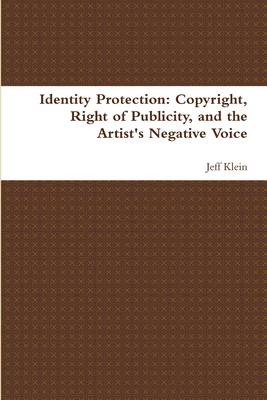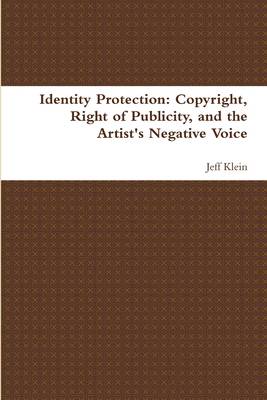
- Afhalen na 1 uur in een winkel met voorraad
- Gratis thuislevering in België vanaf € 30
- Ruim aanbod met 7 miljoen producten
- Afhalen na 1 uur in een winkel met voorraad
- Gratis thuislevering in België vanaf € 30
- Ruim aanbod met 7 miljoen producten
Zoeken
Identity Protection
Copyright, Right of Publicity, and the Artist's Negative Voice
Jeff Klein
Paperback | Engels
€ 13,95
+ 27 punten
Omschrijving
As ethnomusicological studies of the voice expand, so must our understanding of what voice even means. Voice must entail more than just a sonic phenomenon, but must also relate to ideology, to our very identity, even. This thesis will fuse ethnomusicological and legal perspectives to explore how American and, to a lesser extent, international copyright law and other legal mechanisms protect more than just a musician's economic interest, but also his very identity. This thesis will examine where copyright law protects identity and where it falls short and how the right of publicity fills in the gaps to provide comprehensive protection for a musician's voice in the broadest sense. It will provide a background on the scope of copyright law, as well as how it has historically developed to protect more than just work-product, but also the musician's very identity. These explorations can help us understand how musicians can protect their identity by protecting their ideological, as well as their physical, voices.
Specificaties
Betrokkenen
- Auteur(s):
- Uitgeverij:
Inhoud
- Aantal bladzijden:
- 106
- Taal:
- Engels
Eigenschappen
- Productcode (EAN):
- 9781329640542
- Verschijningsdatum:
- 4/02/2014
- Uitvoering:
- Paperback
- Formaat:
- Trade paperback (VS)
- Afmetingen:
- 152 mm x 229 mm
- Gewicht:
- 167 g

Alleen bij Standaard Boekhandel
+ 27 punten op je klantenkaart van Standaard Boekhandel
Beoordelingen
We publiceren alleen reviews die voldoen aan de voorwaarden voor reviews. Bekijk onze voorwaarden voor reviews.











